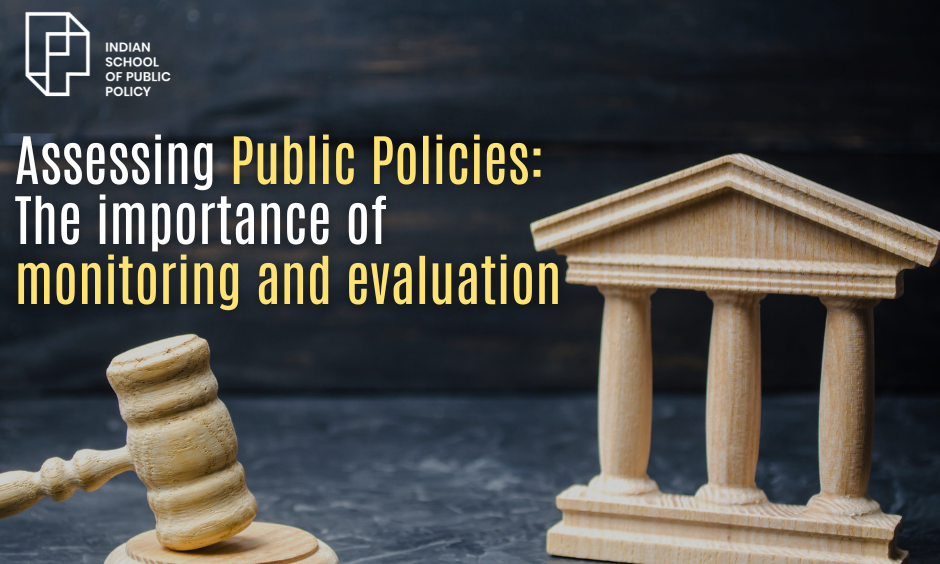Table of Contents
Assessing Public Policies: The importance of monitoring and evaluation

Introduction
The critical role of Monitoring and Evaluation (M&E) in Public Policies cannot be overstated. M&E ensures effective policy implementation, accountability, and transparency, thereby contributing to the modernisation of public administration. This blog explores the significance of M&E in Public Policies, its challenges and opportunities, and how the Indian context is adapting to these needs. It also provides insights into how the Indian School of Public Policy (ISPP) can help you achieve a successful career in this vital sector.
The importance of monitoring and evaluation in Public Policy
Monitoring and evaluation are essential components of the Public Policy cycle. They provide the evidence needed to assess whether policies achieve their intended goals and offer insights for improvements. Effective M&E helps ensure that public resources are used efficiently, promotes transparency and accountability, and builds public trust in government decisions. By systematically collecting and analysing data, policymakers can make informed decisions, adjust strategies, and enhance the overall impact of Public Policies.
Key benefits of M&E:
- Evidence-based decision-making: M&E provides reliable data that helps policymakers make informed decisions.
- Accountability and transparency: Regular monitoring and evaluation ensure that governments remain accountable to their citizens.
- Improved policy design and implementation: M&E allows for continuous improvement in policy design and implementation by understanding what works and what doesn’t.
- Resource allocation: M&E helps in the optimal allocation of resources by identifying areas that require more attention and those where resources can be reduced.
Monitoring and evaluation practices in Western Balkan countries
- Monitoring and evaluation of PAR in WB countries
Governments in WB countries have implemented various M&E practices to monitor Public Administration Reform (PAR) strategies. While Bosnia and Herzegovina produce bi-annual and annual reports on PAR Strategy objectives, Serbia has introduced performance indicator passports for better reliability (PIP). Kosovo and Montenegro are developing new M&E systems, focusing on quantitative and qualitative performance indicators.
- Role of civil society organisations (CSOs)
CSOs play a crucial role in M&E by providing external oversight and bridging the gap between the public sector and civil society. For instance, the GAP Institute in Kosovo and the European Policy Institute in Macedonia have been instrumental in policy M&E. The involvement of CSOs enhances the credibility of M&E processes and ensures transparency and accountability.
- Regional initiatives
The South East Europe (SEE) Strategy 2020 and OECD/SIGMA Baseline measurement are notable regional initiatives aimed at boosting socio-economic development in the Balkans. These initiatives emphasise the importance of evidence-based Public Policy but face challenges related to data collection and the relevance of indicators.
Challenges in monitoring and evaluation of Public Policies
Despite the progress, WB countries encounter significant challenges in M&E, including:
Data availability and quality
The availability and quality of data are critical issues. Countries often struggle with data fragmentation and lack timely, credible performance indicators. Establishing comprehensive data collection frameworks and aligning register data sets with performance information demands are essential to overcome these challenges.
Involvement of CSOs
While CSOs have the resources and skills for effective M&E, public sector organisations often lack the capacity to fully involve them. Creating a conducive environment for CSO participation and fostering a culture of cooperation can bridge this gap.
Assignment of monitoring and evaluation roles and responsibilities
Clear assignment of M&E roles and responsibilities at various levels is crucial. Central M&E functions, sectoral coordination, and line department analysis functions must be well-defined to ensure effective M&E processes.
Awareness and skills gaps
The lack of awareness among managers and the skill gaps in staff for M&E hinder the effectiveness of M&E activities. Conducting capacity and training needs assessments and designing targeted training programmes can address these issues.
Areas for ReSPA intervention
The Regional School of Public Administration (ReSPA) can play a pivotal role in enhancing M&E practices in WB countries by:
- Creating databases for PAR monitoring purposes.
- Developing methodological frameworks for performance indicators.
- Organising networking, training, and awareness events for public sector organisations and CSOs.
- Preparing standard descriptions of M&E functions and job descriptions.
- Conducting capacity and training needs assessments.
- Designing and conducting training activities on M&E.
- Developing basic methodologies for M&E in PAR and other sectors.
- Assessing public consultation practices and proposing recommendations.
Monitoring and evaluation of Public Policies in the Indian context
India has a robust M&E framework led by institutions like the National Institution for Transforming India (NITI Aayog). NITI Aayog has been instrumental in implementing the Development Monitoring and Evaluation Office (DMEO) to monitor and evaluate the performance of government schemes and initiatives.
Key elements of India’s monitoring and evaluation framework
- Use of technology: India leverages technology for real-time monitoring through platforms like the PM Dashboard, which tracks the progress of various government schemes.
- Citizen participation: The MyGov platform encourages citizen engagement in policy-making and feedback, enhancing transparency and accountability.
- Data-driven decisions: Initiatives like the Aspirational Districts Programme use data to identify and address regional disparities, ensuring targeted and effective policy interventions.
How the Indian School of Public Policy (ISPP) can help you succeed in the M&E sector
If you aspire to work in the Public Policy Monitoring and Evaluation sector, the Indian School of Public Policy (ISPP) offers a comprehensive programme designed to equip you with the necessary skills and knowledge.
Programme overview
The one-year programme provides an in-depth understanding of Public Policy formulation and equips students with design and management precepts. The objective is to develop better systems thinkers and policy executives, making graduates well-prepared for careers in M&E.
Immersive learning engagement (ILE)
ISPP offers high-impact, unique learning experiences through Immersive Learning Engagement (ILE). Scholars collaborate on real-time projects guided by project leads from client organisations. This hands-on approach enables students to immerse themselves in live projects related to Public Policy in India, facilitating learning by doing. Past ILE partners include E&Y, Sattva, NITI Aayog, and the Population Foundation of India.
Academic structure
The curriculum integrates classroom learning, skill building, application, and leadership training, comprising foundation, core, and supporting courses. The programme is designed on skills, ethics, and leadership, ensuring a comprehensive education in Public Policy.
Curriculum highlights
- Diverse dimensions: The programme covers various aspects of Public Policy education, aligning with the best global policy programmes.
- Capacity and flexibility: The curriculum is designed to be adaptable and innovative, ensuring students attend relevant courses and practical knowledge sessions.
- Industry-Ready skills: The programme includes compulsory courses, workshops, labs, and collaborative certificates delivered by policy veterans and field experts, aligning students’ skills with industry needs.
Why choose ISPP?
ISPP’s Postgraduate Programme in Public Policy, Design, and Management is tailored to make you industry-ready. It combines theoretical knowledge with practical experience, providing a holistic education that prepares you for a successful Public Policy M&E sector career.
Conclusion
Effective Monitoring and Evaluation are indispensable for the success of Public Policies. Addressing the challenges and leveraging the support of regional initiatives like ReSPA, WB countries, and India can enhance their M&E systems, leading to better governance, increased transparency, and improved socio-economic development. Continuous learning and adaptation, driven by robust M&E practices, are key to achieving sustainable policy outcomes. As we move forward, governments and stakeholders need to embrace M&E as a critical component of the policy-making process, ensuring that policies not only meet their objectives but also adapt to the evolving needs of society.
Register your Interest to Study at ISPP




